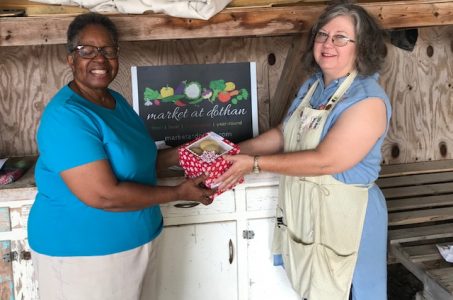Post contributed by Jessica Kelton, Regional Extension Agent, Farm & Agribusiness Management Team
With the advent of the internet, almost every aspect of our lives have changed. Access to information is instant, banking and bill paying can be done from a mobile device, and even shopping by U.S. consumers has shifted to online in lieu of brick and mortar stores. In previous years, online grocery purchases have been a relatively small percentage of online sales, however, the trend toward internet grocery shopping is growing dramatically. A recent Nielsen survey reported that nearly 50% of consumers had made grocery purchases within the last three months, and this number is expected to continue to grow. Given the demand for buying with the click of a button, how can small farms and agribusinesses remain relevant and economically viable when traditional in person sales are at risk of declining in the future?
One such solution to this issue, particularly for small and niche market producers, is a relatively simple, but unique sales model that brings together many local growers to provide customers an online farmers market. The online farmers market system, a concept which has been implemented by LocallyGrown.net, an Athens, GA based company established in 2007, is somewhat of a mesh between farmers market and CSA. The basis of the system is to provide an online platform for many local producers to come together with each having their own ‘booth’ to list items for sell each week. Customers can then choose what they want to buy before the order deadline and pick up their purchases once a week similar to a traditional CSA. There are several advantages to vendors participating in an online farmers market. It provides small growers a marketing avenue even if they can’t produce enough to stock a weekly booth at a traditional farmers market. This method of internet sales also gives smaller producers the ability to spread the cost of the online system among multiple vendors rather than individually shouldering the expense and time investment required to operate and manage a website for online purchases.

Market manager, Roslyn Horton (right) with Birdie Martin of Martin Teas.
In the southeast corner of Alabama, the Market at Dothan has been successfully using this online model for several years, providing its customers access to over 20 vendors’ products on a year-round basis. The Market, managed by Roslyn Horton, is unique in that it isn’t just in place because it makes financial sense for the farms involved. The growers are a close-knit community that all ascribe to utilizing farming practices that are environmentally and financially sustainable. Vendors are committed to producing products free of pesticides and located within 100 miles of Dothan to reduce fuel consumption and provide the freshly harvested goods to its customers. Not only does the Market provide the local community access to sustainably grown products, members also strive to serve as educators and proponents of sustainable agriculture and the value of these management practices.
A visit to the Market at Dothan’s Friday morning pick up site is a great indication of the current success and future potential of the online market model. With all of the growers walking in with everything from fresh eggs to grass-fed beef and customers dropping by to pay and pick up bags of purchases, it was evident that for everyone there, this was about more than just buying and selling. This was a group of people coming together to fellowship, catch up, talk shop and enjoy being a part of this community. Too often, this sense of community is lost to consumers when making a purchase on computer. However, with the Market’s mix of online and in-person service, customers have the opportunity to shop from home at their leisure without sacrificing the ability to personally connect with the individuals that grow and produce what they are buying. It’s this piece, the piece that gives customers a reason to keep coming back, that adds to the success of this model. And it is unique ideas like this that will help keep Alabama’s small farmers in business for years to come.




